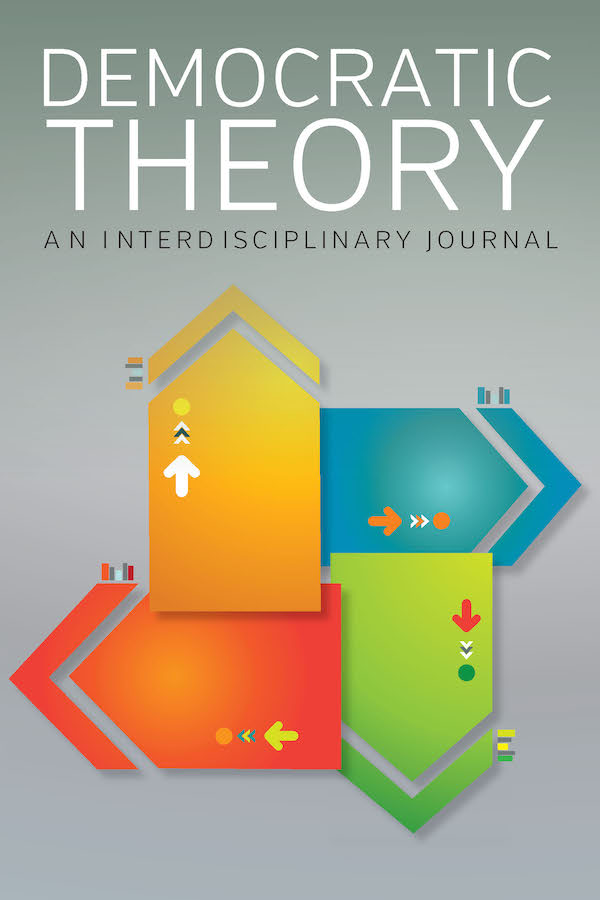
Democratic Theory
An Interdisciplinary Journal
ISSN: 2332-8894 (print) • ISSN: 2332-8908 (online) • 2 issues per year
Editors-in-Chief:
Emily Beausoleil, Victoria University of Wellington
Jean-Paul Gagnon, University of Canberra
Subjects: Political Theory
Latest Issue
Volume 12 Issue 2
Introduction: When Is Democracy?
Tracing Time in Democratic Theory
Time is among the most fundamental categories of political and, specifically, democratic life. While time in the sociopolitical world leaves traces in many (subtle) ways, we do not find it among the guiding concepts of democratic theory. This Special Issue, therefore, understands itself as part of a project that traces the centrality of time and temporality in democratic theory and practice. Our goal is to move toward an in-depth discussion of time in democratic theory by unearthing and systematizing the fragments of this emerging agenda. In this editorial, we deepen the status of time in democratic theory. We do this by discussing both the research that explicitly addresses the relationship between time and democracy and the many latent forms of how temporality shapes democratic thinking. Finally, we identify three dimensions of how time is relevant in and for democratic theory, and we locate the contributions to this Special Issue regarding these dimensions.
Putting Secularism's Teleology in Its Place
Abdallah Laroui on Time and Democracy
Euro-American discourse on secularism has come to construe it as the foundation of modern democracy and as a civilizational asset of the West. Secularism's teleology posits the secular as an epistemological space in which Western societies have arrived through a successful and completed process of secularization, which the religious and racialized Others of Western modernity must duly follow. Taking Jürgen Habermas's conception of the secular and his imperative to translate religious into secular languages as examples, I first unpack the critical temporal elements of this secularist conception of democracy. Second, I critique this account by analyzing the negatively dialectical understanding of democratic practice, history, time, and translation in the works of the contemporary Moroccan intellectual and historian Abdallah Laroui. I argue that he offers us a more challenging, self-reflective way of conceptualizing the secular and the (Islamic) religious beyond civilizationalist framings.
The Times of Caring Democracy
Feminist Chronopolitics and the Temporalities of Care
This article explores a feminist chronopolitics of care through tracing the (missing) links between care, time and democracy. In democratic and care theories, temporalities have mostly been theorized regarding duration and speed. To extend this limited understanding of democratic and caring temporalities, the article draws on feminist theories of time to theorize the temporalities of care. Drawing on the concept of caring democracy, which centers dependencies and caring relationships, the article expands its limited temporal understanding. The emphasis on the temporalities of care challenges hegemonic temporal regimes based on linear clock-time in capitalist societies. Instead, it proposes reflecting on the multiple temporalities of care and integrating them into democratic processes. This might allow for a move toward a gender- and time-just caring democracy through what I propose to call feminist chronopolitics.
Untimely Becoming
The Queer Time of the Political
Time is not the first concept that comes to mind when we think about democracy. Yet, every notion of the “political” is based on a specific perception of time. While institutionalized democracies are legitimized by a time that appears as objective and linear, more radical approaches to democracy rely on specific “political” times. Drawing on Claude Lefort, Gilles Deleuze, and Félix Guattari, I argue that there are two logics of time that lead to very different political potentials: With Lefort, constant struggles leading to the production of a linear time appear as the political; Deleuze and Guattari emphasize the political potential of queer times that escape any pregiven identity, subjectivity, and linearity. If we conceive of democracy as the structure that realizes the political, the question of time becomes crucial to understand its meanings.
Disrupting the Anthropocene
Temporalities of Mourning and Care in the Postapocalyptic Present
Multiple interrelated global crises challenge political thinkers and activists to engage with temporality. Taking the diagnosis of already unfolding planetary environmental catastrophe seriously, climate activists and environmental scholars in the Global North have increasingly focused on experiences of irredeemable loss. These “postapocalyptic” discourses draw on Indigenous, decolonial, and feminist engagements with temporality to highlight the interconnections between different temporal scales, speeds, and rhythms in the Anthropocene. Moreover, the notion of the postapocalyptic present offers an analytical link between historical narratives about the development of extractive capitalism and social “lived” temporalities of mourning, care, and disruption. Feminist debates about the limits and possibilities of social (care-) strikes here provide important insights about the need to interrupt dominant temporal regimes defined by an incessant drive for heightened economic productivity. Disruptive and prefigurative political practices can in turn create room for experimentation with more sustainable and caring forms of societal organization in a diminished present.